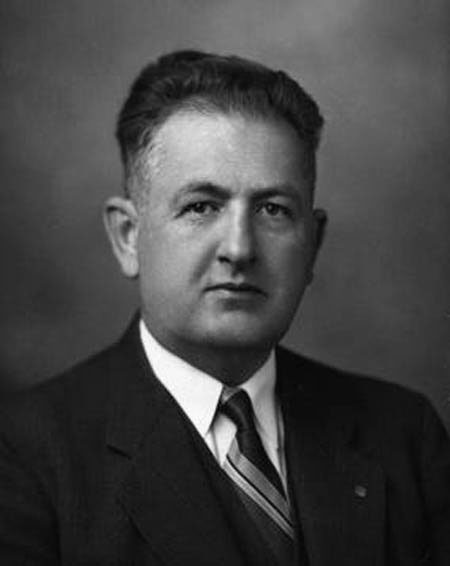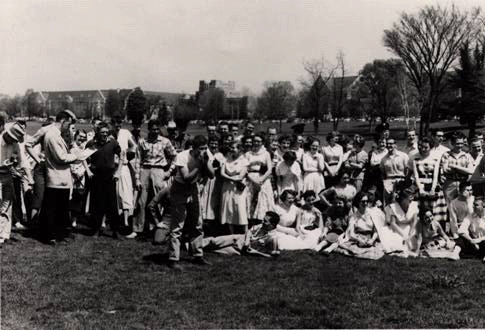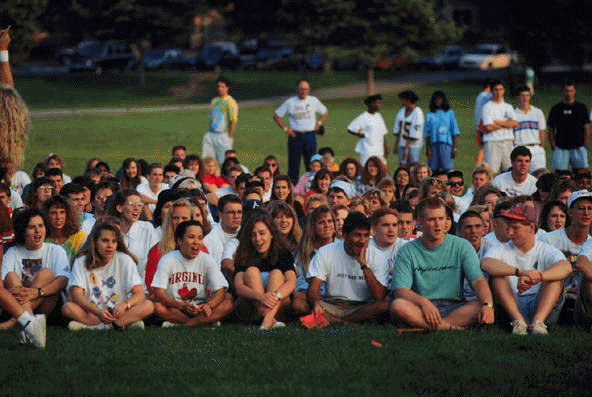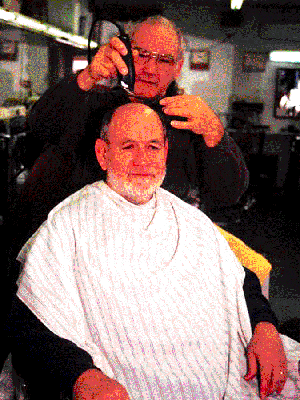Academic anecdotes reveal how classroom culture has changed and remained the same in six decades
by Ronald Dietrick and Netta Smith
Former dean of agriculture and Extension director L.B. "Deet" Dietrick (agriculture M.S. '28), who was known for his piquant wit in telling Virginia Tech stories, never left the university after he came as a graduate student in 1923 until he retired in 1962.
Dietrick's son, Ron Dietrick of Wilmington, N.C., has compiled some of his father's anecdotes, a sampling, he says, "of Dad's stories about the school and the people he loved."
Assistant editor Netta Smith provides a few modern-day counterparts to the tales of the 1930s and '40s.

My father, Leander B. Dietrick, never liked his first name, so he didn't bring it with him when he came from Penn State in the early 1920s to get a master's degree in agriculture at Virginia Tech. To any and all for the next 67 years, he was known as "Deet." It is surely a more euphonious name for "Deet's Place" (the coffee shop in Dietrick Hall) than "Leander's Place" would be. Who would go into "Leander's Place" for a cup of coffee? Certainly not "Deet."
Although a Yankee from the anthracite fields of northeastern Pennsylvania, he never felt out of place in Blacksburg. A typical Virginia town of the time, its people were friendly, but insular, conservative, and well churched. Certain proprieties were observed, standards kept. Thus, Mrs. Burruss, the president's wife, never appeared in downtown Blacksburg without a hat and white gloves. As for insularity, after the Dietricks had been in town for more than 25 years, Deet's wife Mildred was invited by one of the town's longtime residents to a "tea for the newer people in town."
There was little overt anti-Yankee sentiment, though Professor Clifford Harrison of the English department, on a visit to New York City, refused to go down the street where Grant's tomb is. In general, the Dietricks liked the town, and the town liked them.
Deet liked stories about the foibles of professors. Harry Gudheim hated to have a student cut class. Once a student cut a mechanical drawing class, only to be confronted by Gudheim when he next appeared. In his heavily accented English, Gudheim asked, "Why you cut my class the other day?" The student, seated at his drawing board, replied, "Well, sir, I had some business to tend to downtown." An irate Gudheim took out his pen knife and slashed the student's drawing in a big X, saying, "You cut me, I cut you!" The student had to do the drawing again.
 Students, 1940s
Students, 1940s
Another time, it seems that Gudheim was lecturing one day on the subject of infinity. Finally, one student said, "Professor Gudheim, I just don't understand this business about infinity. Could you explain it another way to help me?" Gudheim picked up a piece of chalk and, starting at the blackboard, he drew a line around the room until he came to a window just before he reached the blackboard again. At this point he threw the chalk out the window and said, "Dot iss inwinity!" The student remained as mystified as before.
Paul Swaffar taught animal husbandry. He must have had a lot of patience and humor because he taught a Sunday School class of pre-adolescent boys as well. He was known among his students for requiring a long term paper in his courses. One student, tired after writing so many pages, inserted this sentence in the middle of his paper: "If you've read this far, you're a bigger fool than I think you are, and I'll buy you a carton of cigarettes," feeling sure Swaffer would never read it. When the paper came back, on the outside was the grade and the statement, "Make it Camels!"
A big, rugged farm boy by the name of Starnes came up to Tech from southwest Virginia. Of forthright nature and not easily intimidated, he was in the School of Agriculture, where he had classes under Professor Tom Wolfe (whose son is Tom Wolfe Jr., author of Bonfire of the Vanities.). When calling the roll on the first day of class, Wolfe reached Starnes, who had sprawled his long, lanky form in the front row. Wolfe, who was not of impressive height, looked him over. "Just how tall are you, Mr. Starnes?" he asked. "Six foot two in my stocking feet," said Starnes. "They grow 'em pretty big where you come from, don't they?" Wolfe asked. "I don't know about that, professor, but I've pulled suckers off corn taller than you." It did not sit well.
Later in that same course, they were discussing planting corn when Wolfe asked, "Mister Starnes, on what day in the spring would you plant your corn crop?" Starnes' answer was: "On the day after the first full moon in April." Professor Wolfe pursued the subject, "And where did you get that information, Mr. Starnes?" Now, the proper answer was supposed to be The Manual of Field Crops co-authored by Wolfe and T.B. Hutcheson. Starnes' answer came back in a strong voice, "Sears Roebuck catalog!"
One final story comes from an incident that occurred after Deet was dean of agriculture. Budget proposals were being prepared for a meeting with the governor in Richmond. Deet and associate Extension director Bill Daughtrey had labored over facts and figures. As Daughtrey rose to leave, he was asked, "Bill, there is a little problem I'd like your advice on."
"Sure Deet, what is it?"
"Well, I had a student in to see me the other day. It seems he has flunked out three times, but he came pleading for one more chance. Should I make an exception?"
Bill said, "Deet, you know the rules. Anyone who has flunked out three times can't get back in. He should have resigned before he flunked out the third time."
"Well, would it make any difference if I told you this young man assures me that he has learned his lesson, and if I will give him just one more chance, he will make good on it? He seems to be a fine young man."
Bill replied, "No, you can't make an exception just because a student says he will do better."
"Well, would it make any difference if I told you that this boy's father is a wealthy Virginia farmer and a longtime supporter of VPI?"
Bill was adamant. "Still doesn't make any difference, you have to follow the rules!"
Deet followed up, "Bill, you know we're going to Richmond next week to meet with the governor on the budget. Would it make any difference if I told you this boy's father is governor of Virginia?"
Bill looked at Deet for a long moment; then he said, "Deet, you go to hell!"
 Students, 1990s
Students, 1990s
Present-day professors have amassed their own store of classroom anecdotes. Even though the university has grown and new technologies have changed the way faculty members teach, many of the stories from today could just as easily have happened in Deet's time.
Hugh Munson of the engineering fundamentals department has a habit of dismissing his classes with the words, "Ready? One, two, three, go away." Once he was hovering over a group of students who were working on a problem. As they continued to have difficulty, Munson moved closer and closer as the students grew more and more frustrated. Finally, one of the students looked up at him, smiled, and said, "Ready? One, two, three, go away!"
 On another occasion, a student who had failed to show up for a scheduled appointment for a required meeting with Munson said, "I came by your office and you weren't there." Munson, who is bald, replied, "I guess I had gone to get a haircut." When the student said he found that hard to believe, Munson, who knew he had been at his office at the appointed time, retorted that he also found the student's excuse hard to believe.
On another occasion, a student who had failed to show up for a scheduled appointment for a required meeting with Munson said, "I came by your office and you weren't there." Munson, who is bald, replied, "I guess I had gone to get a haircut." When the student said he found that hard to believe, Munson, who knew he had been at his office at the appointed time, retorted that he also found the student's excuse hard to believe.
Mary Beth Oliver of communication studies became particularly fond of one group of students that she describes as hard-working, bright, funny, insightful -- "everything a professor could ask for." On the last day of class, she told them how much she had enjoyed teaching them. After her rather long, emotional speech, the class was silent for a moment. Then, from the back of the room, a student quoted a line from a popular television commercial: "We're glad you like us so much, but you're not getting our Bud Light!"
Jay Sullivan of the forestry department teaches a lab that uses the computer a great deal. Recently he was explaining the lab exercise for that week and kept telling the students to hit "carriage return" after each line of information. When he finished his explanation and asked if there were any additional questions, a student raised her hand and asked what a carriage return was.
"After recovering from the shock of learning how far out of touch I was (although clearly still in my youth at age 39), I found myself explaining how a typewriter worked," Sullivan says. After he had explained where his terminology came from, one of the students replied, "I guess you must have used typewriters back when you had to walk 10 miles to school in 10 feet of snow."
The age-old problem of classroom discipline rears its head from time to time. Louis Gwin of communication studies became upset with a class that continued to talk after he began his lecture. After several class periods and what he describes as gentle attempts to quiet the class, he exploded and stormed out of the classroom. At the next class meeting, the students presented him with a bullwhip and told him to feel free to use it on them if they ever got out of line again. "I thought that was a very effective way to diffuse my anger, apologize, and give us all a good laugh," Gwin says. The class never acted up again.
Modern technology has given students a 20th-century way of annoying professors. In a large core-curriculum class taught by Tim Mack of entomology, two students enjoyed shining laser pointer dots at the professor's back each time he turned around to write on the board. Other students were becoming annoyed, but Mack could not determine who was using the hand-held pointers that have recently become popular at concerts and as a classroom distraction.
One day, Mack called on a student and asked for comments about the class. "Well, I don't really like the laser dot that's pointed at me right now," the student replied. Mack dealt directly, "You mean the one coming from over there? If somebody wants to play games with a laser pointer, it's an indication that the class isn't interesting. I'm not going to scream at anybody. I'll just try to keep your attention better from now on." The laser pointer was turned off, the students cheered, and the dots never reappeared in class.
Dr. Ron Dietrick did part of his growing up in Extension departments on the Virginia Tech campus, but, except for one summer quarter at Tech, did his college studies at Davidson College and the University of Pennsylvania School of Medicine. He served as a medical missionary with the Presbyterian Church in South Korea before returning to the United States in 1985.
Back to Features
Home | News | Features | Research | Philanthropy | President's Message | Athletics | Alumni | Classnotes | Editor's Page


 Students, 1940s
Students, 1940s Students, 1990s
Students, 1990s On another occasion, a student who had failed to show up for a scheduled appointment for a required meeting with Munson said, "I came by your office and you weren't there." Munson, who is bald, replied, "I guess I had gone to get a haircut." When the student said he found that hard to believe, Munson, who knew he had been at his office at the appointed time, retorted that he also found the student's excuse hard to believe.
On another occasion, a student who had failed to show up for a scheduled appointment for a required meeting with Munson said, "I came by your office and you weren't there." Munson, who is bald, replied, "I guess I had gone to get a haircut." When the student said he found that hard to believe, Munson, who knew he had been at his office at the appointed time, retorted that he also found the student's excuse hard to believe.